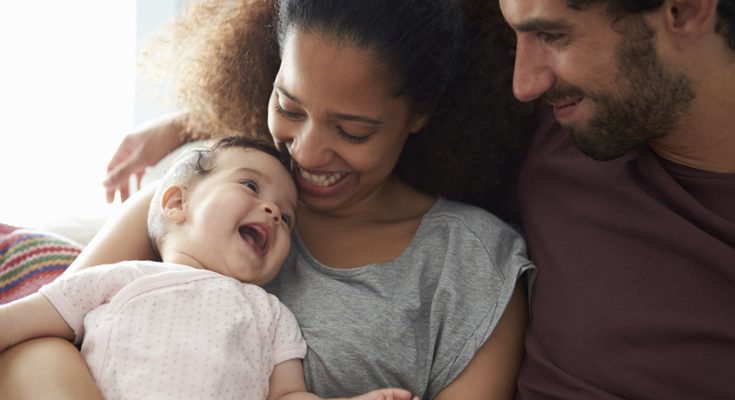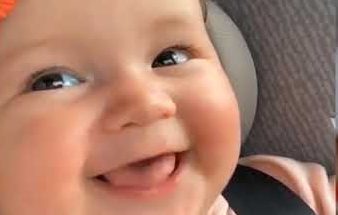You love your baby like crazy, but do they love you, too? Of course they do! They just may not be able to say it yet. But even before your baby, toddler, or preschooler can verbalize their affection, they’re showing it. The proof is in your child’s developmental milestones and behavioral cues.
Look closely, and you’ll see plenty of signs that your baby trusts you and loves you – trust and attachment are the main love languages for kids. Here are the adorable and sometimes unexpected ways that your little one shows their love.
When do babies start showing affection?
The bond between babies and their caregivers starts immediately after birth. When your baby cries and you promptly and sensitively respond, you’re building a secure attachment, and that attachment is the foundation for emotional health and future expressions of love.
When your baby is very young, they show their affection by being comforted by you. Soon after birth, you may notice that your baby settles in when you hold them. (That said, if you’re having trouble soothing them, don’t be alarmed, that’s normal too!) By 2 months, most babies will look happy to see you, and they’ll smile when you talk to them. For many parents, those smiles are a heartwarming first glimpse of true affection. By 4 months, your baby will be smiling unprompted, hoping to catch your attention with a little “I love you” from across the room.
Love languages for kids aren’t complex: If you take care of your child, they’re going to love you. You can start building trust with your baby as soon as they’re born by responding when they cry and meeting their needs. If your baby trusts you, they’ll also trust that the world is a safe place. This is known as a secure attachment, which is critical for healthy emotional development throughout your baby’s lifetime.
Signs your baby loves you
Babies stare into your eyes. We’ve all been told staring is rude, but when babies stare, it’s downright adorable. Newborns love to look at faces, and yours is their favorite. By 2 months, most babies have perfected the soulful gaze that’s a hardwired survival instinct designed to attract love and attention from their caregiver. Yes, it’s instinct, but it’s also showing you that your baby loves you.
They recognize your smell. Given the choice between a dozen fragrant roses and your sweaty, milk-stained T-shirt, your baby will go for the shirt every time. A mom’s scent makes babies feel safe and encourages socialization. To your newborn, nothing smells sweeter than you, so next time they snuggle in, take it as a sign of their love.
They smile at you. The first time your baby gives you a true grin is a magical moment. It’s their way of saying “I love you.” Most babies will smile back if you smile at them by the time they’re 2 months; by 4 months, they’ll smile to get your attention, which is somehow even more adorable.
They talk to you. Your baby’s very earliest coos will be directed at you or another trusted caregiver – it’s their way of saying, “love you too!” By 4 months, babies will make sounds in response to your voice and turn their head to try to find you when you’re talking. That shows they want to listen to everything you have to say – at least for now!
They want you around. As babies become more aware of the world around them, they begin to notice that some people are familiar, and those people are their favorites. By 6 months, babies will recognize the people they love, like grandparents, siblings, and of course, parents. Soon, they’ll show a clear preference for those loved ones, displaying caution around strangers and even possibly developing some separation anxiety by 9 months.
They share your interests. Whether it’s holiday lights or the dirty laundry, if you scrutinize it, your baby will do the same. Called joint attention, this behavior can start when your baby is just a few months old, but it’s more pronounced at 9 to 12 months.
They use you as a shield. Don’t be surprised if your baby buries their head in your chest when someone new appears on the scene. “Stranger anxiety” is a normal phase, and turning to you for protection means your baby loves you and trusts you to keep them safe.
When will your baby smile, laugh, learn to give hugs, and make friends? Learn about the major relationship milestones from birth to age 8.
Signs your toddler loves you
They give cuddles and kisses. Unprompted affection? Yes, please! By 15 months, your toddler will give you surprise physical affection, so be prepared for hugs, cuddles, and sloppy kisses.
They take their cues from you. How would your toddler react to an elephant frying an egg in the kitchen? Chances are, they’d look to you. The world can be a confusing and surprising place for toddlers, and they use your reactions to make sense of it. They love you and trust your opinion. Beginning around 9 months, you’ll see your little nugget looking to you for reassurance.
They copy your behavior. Does your toddler try to open the door with your keys? Do they “fix” their hair in the mirror like you? Imitation is indeed the sincerest form of flattery, and toddlers are the masters of it.
They engage with you. The back-and-forth that started during babyhood is much more sophisticated now. Your toddler wants to answer your questions, witness your reaction to what they’re doing, and tell you (in their own way) about their ideas. Known as social-emotional reciprocity, this is a sign of your toddler’s attachment to and confidence in you.
They use you as home base. In a new environment, your toddler may alternate between exploring and running back to snuggle in your lap. They may even glance back to you for reassurance. It’s a sure sign of trust and attachment.
They turn to you for rescue. You’re walking through the park when a big dog runs up to your toddler. They raise their arms for you to pick them up and hold them close. It seems entirely natural, but it’s also a sweet sign that your toddler loves and trusts you.
They seek comfort from you. Your toddler may hold out their hand so that you can kiss a boo-boo, or cry for you to cuddle them after a fall. They know they can count on you for comfort, and they trust that you’ll be there to provide it.



